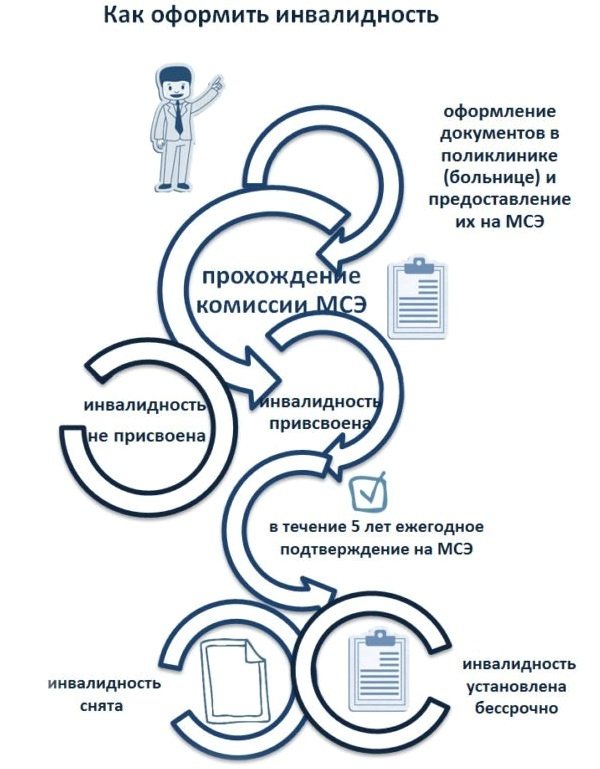Is it worth applying?
Most parents, faced with the problem of a child having a serious illness, are in no hurry to register for disability. This is due to the fact that parents are afraid that becoming disabled can put an end to the child’s future life and interfere with his socialization and education. Some, moreover, are afraid that they will only waste their time and traumatize the child without receiving anything in return.
In fact, it is advisable to apply for disability as early as possible. Having a medical certificate provides a number of advantages, the main one of which is the opportunity to receive a special rehabilitation program for the child, funds and medications for its completion.
We list the main types of benefits that a disabled child can count on. Please note that some of them may be provided only in certain regions or by individual sellers (this applies to benefits for the purchase of certain products, discounts on goods and services):
- housing benefits;
- free travel on public transport;
- receiving free medicines for treatment;
- free access to the Internet;
- cable television connection on a preferential basis;
- benefits for telephone services;
- discounts on the purchase of funds and essential items;
- labor and pension benefits;
- benefits when entering a university;
- sanitary and resort improvement.
Benefits are also provided for parents:
- social pension;
- allowance for caring for a disabled child in the amount of 60% of the minimum wage;
- inclusion of time spent with a disabled child in the work experience;
- the possibility of retirement after 50 with at least 15 years of experience.
The conditions for providing benefits should be clarified at the social security department at your place of residence.
Cost of the procedure, benefits
Medical and social examination in the country is carried out completely free of charge. Preliminary tests also do not involve charging any amount - this is true if the examination is carried out in public medical institutions.
If the patient’s representatives decide to undergo a commission at a commercial clinic with accreditation, then the price tag in this case depends on the specific company.
A disabled child and his or her family are entitled to a wide variety of benefits, as listed in the table below.
| Types of benefits | Characteristic |
| Pension benefits |
|
| Labor benefits |
|
| Housing benefits |
|
| Transport benefits |
|
| Benefits for education and training |
|
| Benefits for special types of services |
|
In addition to the basic benefits listed above, disabled children and their representatives can count on many additional services approved by the Government.
Normative base
Today in Russia the following legislative acts are in force that regulate issues of registration of disability and the availability of certain benefits:
- Decree of the Government of the Russian Federation of February 20, 2006, No. 95 “On the procedure and conditions for recognizing a person as disabled.”
- Changes to the Decree of the Government of the Russian Federation in the above-mentioned document dated April 7, 2008, No. 247.
- Approved by order of the Ministry of Health and Social Development of August 22, 2005 No. 535 Classifications and criteria for conducting MSEC.
- Children's Disability Law.
- Order of the Ministry of Health No. 317, which sets out the procedure for conducting MSA.
- Federal laws that establish the rights of people with disabilities and the procedure for receiving social benefits and social protection.
What are the rules of procedure?
The general procedure for passing the medical examination is prescribed in the Rules for Obtaining Disability, but the general sequence of actions is that first of all you go to the pediatrician, then act according to the circumstances. Either he will already give you a referral to ITU, or refer you to other specialists.
After receiving advice from other specialists, you can sign up for an examination and collect documents and certificates. Go through the commission and get a decision.
If the decision is positive, you will be given a certificate of disability and an individual rehabilitation program. For adults, a certificate of temporary disability is also issued. After this, an extract is made from the certificate of completion of the ITU and sent to the pension fund or social security authorities.
Procedure
Registration of disability always begins with the fact that you bring the child to the appropriate doctor, who will examine him and make a preliminary decision on whether it is possible to register a disability. Then, based on the decision, he issues referrals for examinations at the clinic.

For genetic diseases (autism, Down syndrome), a referral is given by a psychiatrist, since genetic diseases are often accompanied by varying degrees of mental retardation. It is believed that it is the level of mental development in this situation that is the main factor that interferes with the socialization of the child. To obtain all the necessary certificates, you will have to undergo examination by the following doctors:
- ophthalmologist;
- otolaryngologist;
- surgeon;
- neurologist;
- orthopedic surgeon;
- endocrinologist.
In addition, you will need to take a general urine and stool test, and in some cases, take additional tests, for example, an ECG, audiogram, or genetic blood test.
Depending on the child’s condition and the presence of other diseases, a visit may be necessary:
- speech therapist;
- genetics;
- urologist;
- cardiologist and other specialists.
A complete list of doctors and the time frame within which all tests should be taken is indicated by the doctor who gives the referral. Pay special attention to this, because if any analysis is overdue, you will have to start all over again.
In order to avoid problems and get through everything as quickly as possible, you must:
- Specify the validity period of all analyzes and conclusions. Those that have a shorter validity period are best left for last.
- Find out the schedule of all doctors - how they work, whether they have gone on vacation.
- If a specialist is not in your clinic, find out where, when and how you can get an appointment with him.
After all the certificates have been collected, you need to provide everything to the local pediatrician or the doctor who gave the referral for examination - this should be clarified directly at the first appointment.
The doctor draws up a final epicrisis, including all diseases, vaccinations and diagnoses given to the child. In case of a genetic disorder, a doctor's report must be submitted to a neuropsychiatric dispensary. And there you are given a referral to ITU.
Schematically, the registration of disability is as follows:

How can children get disability?
Do you think that your child should receive a disability? Then read the information about the order in which you need to act, what to prepare for and what to expect.
Don't expect that wherever you go you will be eagerly awaited. Not only your child needs help, so try to be patient and then everything will work out for you.
Take directions to pass the commission
When you see a doctor, you will be given a referral to undergo medical examination; this document must be correctly filled out and certified with signatures and seals. After this, you need to collect all the documents necessary to pass the examination.
We'll look at what you need to take with you below. So, you have arrived at the hospital for a pathology examination and receiving disability. You will need to write a corresponding application. An interesting fact is that the disability pension will be calculated from the moment your application is signed.
If we talk about passing a commission for a child, the attending physician gives several referrals to specialists of a broader profile. What doctors will need to be seen?
- ENT;
- ophthalmologist;
- surgeon;
- orthopedist;
- neurologist;
- endocrinologist
Before you go on a visit to the above-mentioned specialists, you need to find out exactly what deadlines are set for undergoing examinations. At the same time, you should understand that everyone, without exception, needs to visit them. Before visiting doctors, it would be advisable to take general blood and urine tests.
Get expert opinions
If specialists need additional tests, they will definitely write you a referral to take them. After you have done all this, you need to go back to the pediatrician, who will write an epicrisis and a medical history. Then the doctor submits these documents to the manager for signature.
If, during an examination by specialists, some disturbances in mental development were identified, then the doctors’ opinions will need to be submitted to a psycho-neurological dispensary.
Based on the results of the examination, each specialist makes his own conclusion, on the basis of which a decision is made to assign disability or refuse.
Timing and priority
To pass the examination, you will need a lot of time, effort and endurance, since the total time to complete the examination can take from one to two months. It would seem that everything is simple and you can pass the commission in just a couple of days, but this process is not quick.
According to the Disability Rules, your application may take up to three weeks to be signed by the head of the clinic. In addition, often the doctors who need to be seen may be in different parts of the city, and with a child it is more difficult to see everyone at once. In addition, there is always a queue to see specialists by appointment, and it is not yet known when you will be able to get an appointment with him.
IPR certificates
A certificate from an individual rehabilitation program for a disabled person is a very specific list of what the patient must adhere to due to his illness. Such a program is being developed by federal institutions of ITU; it represents a whole range of measures that are provided for the period of disability.
If you stick to them, recovery should come faster. These measures are aimed at eliminating the causes and consequences that resulted from pathologies.
This document must be issued to a person who is recognized as disabled and in need of social assistance.
Characteristics from school
For children who are studying, in addition to the established list of documents, you will need to provide a reference from the educational institution. But in order for it to be issued to you, it is necessary for the attending physician to send a request to the school to obtain a reference.
This document is compiled by the class teacher of the child who is undergoing an examination; this also takes time.
Documentation
After you have gone through the specialists, you should collect a package of papers with which you will have to apply to the commission. This includes:
- Original and copy of the child's birth certificate. If he has reached the age of 14, a passport is required instead of a certificate.
- Copies and originals of medical certificates, extracts and medical histories that confirm the presence of disturbances in the functioning of the child’s body functions.
- Referral to medical examination received at the clinic or at the social security department (certificate in form No. 080/u-06).
form for referring a child to ITU (form No. 080у - 97) in .doc (Word) format - Application from parents or guardians of a child for an examination. A copy of the applicant's passport must be attached to it.
- Characteristics of the child, received at the educational institution and certified by the class teacher and director, with two seals - square and round. The same applies to children attending kindergarten.
- Child's outpatient card.
When re-examining, a pink certificate received during the previous ITU is also required.
Please note that this is a complete package of documents. You do not have the right to demand any additional papers.
List of diseases to determine the group
The group is determined by disease:
- hematopoiesis and blood circulation;
- digestive systems;
- musculoskeletal system;
- respiratory functions;
- sense organs;
- metabolic processes;
- psyche.
Important: not all positions in the above diseases are sufficient for the commission to establish a category.
For example, a person with oncology, only after completing a special rehabilitation course and the absence of the planned effect, can be sent to a commission to determine the need to assign disability group 2. If the need for this has not been identified, then the patient’s sick leave is simply extended.
A few words about the characteristics
The question of characterization is worth considering in more detail.
As already mentioned, it is provided if the child attends kindergarten or school. If the child does not attend an educational institution at the time of the examination, for example, he is 3 years old and does not go to kindergarten, a reference is not needed. But if a child attends a special correctional educational institution, then they do not have the right to give you a reference. This is due to the so-called psychiatric mystery. In this case, only a doctor has the right to request a description.
Medical examination
The next step is to sign up for a medical and social examination at the main bureau of your city.
A package of papers is also provided there. After submitting the documents, you are assigned a date for the examination. Usually it is carried out within a month from the date of submission of papers. If a child cannot attend the examination in person due to health reasons, it is important to indicate this in the application and note that an on-site examination is necessary. At the specified time, you must arrive at the commission. You need to take with you a diaper for examination, as well as replacement shoes for yourself and the child, or, in extreme cases, shoe covers.
The examination is carried out by medical experts who have pediatric specialization. The commission must have at least 4 people, otherwise the commission’s decision may be considered unlawful.
At the invitation of the head of the ITU, the child’s attending physician, representatives of various kinds of state extra-budgetary funds, and representatives of the public may also be present with the right of an advisory vote.
When conducting an examination, a protocol is drawn up, and based on the results, a report is drawn up, which is signed by specialists and the head of the bureau in which the decision was made. All documents are certified by a seal.
What documents will be needed?
To begin the procedure for obtaining disability, you will need the following documents:
- a document that identifies the citizen; in the case of a mother with a child, the mother’s passport and the child’s birth certificate or passport will be required;
- application for a medical and social examination;
- referral from the attending physician.
Additional documents may be required - this is the child’s characteristics from school, an outpatient card, certificates that indicate that the citizen has obvious health problems.
Solution
What decisions can be made? By a majority vote, the commission may:
- Refuse to grant disability.
- Recognize the person as a disabled child, establishing the validity period of the disability and developing an IPR.
- Recognize a person as a disabled child, indicating the validity period of the certificate until he reaches 18 years of age. It also involves the development of IPR.
- Make a decision on the need for additional examination of the child.

When can you apply for disability?
Disability can be issued if there are signs of disability:
- health impairment with persistent impairment of body functions caused by diseases, consequences of injuries or defects;
- limitation of life activity (complete or partial loss by a citizen of the ability or ability to provide self-care, move independently, navigate, communicate, control one’s behavior, study or engage in work);
- the need for social protection measures, including rehabilitation and habilitation.
The decision to recognize a person as disabled is made based on the results of a medical and social examination (MSE).
Depending on their health status, adults are assigned disability group I, II or III, and children under 18 years of age are assigned the category “disabled child.”
Special cases of registration
Let us consider cases of disability registration in children with some specific diseases:
- With a disability,
it is quite difficult to apply for disability. This issue should be resolved exclusively by the treating psychotherapist. It is he who gives recommendations and develops a strategy for parental behavior for registering disability. - In case of autism,
a referral to ITU is given by a psychologist. Disability is given for a year, then extended. Its presence allows you to create a suitable atmosphere for your child for his development, saving on expensive treatment and care. - For Down syndrome,
the referral is given by the attending psychotherapist. To register a disability, the child must visit a geneticist and have an EEG and ECG done. - For bronchial asthma,
the main condition is to treat the child in a hospital for the last 12 months. It is necessary to pass: a blood test - general and biochemical, for sugar levels, culture and general sputum analysis, do spirography, prepare an x-ray of the lungs, ECG. Children with mild or moderate severity of bronchial asthma are not prescribed disability, since at this age there is a high chance that the disease will go away on its own.
Please note that if the diagnosis of allergic bronchial asthma is indicated, you will be denied disability. To avoid this, take your child to an allergist and have an allergy test done to rule out the possibility of an allergy.
- With epilepsy,
it is not always possible to get a disability. When registering, it is taken into account how much the patient’s quality of life is reduced - how frequent the attacks are, whether there are disorders of the musculoskeletal system, mental disorders, visual or hearing impairments. For registration, you need an EEG, CT and MRI, a discharge from an epileptologist, a conclusion from an allergist-pulmonologist and hematologist, a detailed and biochemical blood test, and an analysis of the content of drugs used in epilepsy in the blood.
Registration of disability for children
Autistic
Disability for a child diagnosed with autism is formalized according to the general scheme, but with some nuances. For example, the initial examination and drawing up of the final report should take place with a psychiatrist.
There is a need to undergo a neurologist, speech therapist and ENT specialist, as well as an EEG (preferably during sleep), blood and urine tests.
In neurology
A referral for a commission on neurological diseases is obviously obtained from a neurologist. The standard procedure will be supplemented by special examinations that are designed to identify relevant violations.
With ZPR
In case of mental retardation, a referral for a commission is taken either from a pediatrician or directly from a neurologist. After this, you need to register with the psychoneurological dispensary by calling and requesting appointment hours.
A neurologist conducts an initial examination and schedules a consultation with a speech therapist and psychiatrist in the same medical organization. In the future, the procedure for registration is no different from the general instructions.









